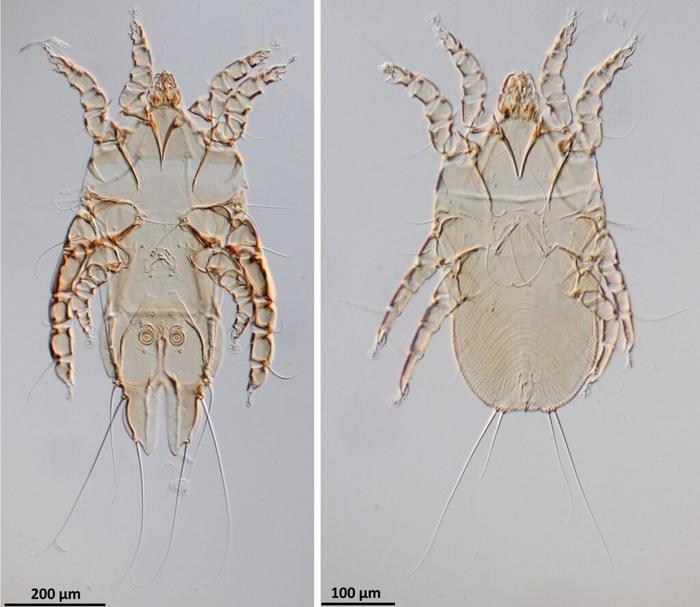A research group led by Dr. Tsukasa Waki of Toho University and Professor Satoshi Shimanono of Hosei University discovered a new mite species, Metanalges agachi, which was thought to clean the feathers of the endangered Okinawa rail, endemic to the northern part of Okinawa Island, Japan. It has been 43 years since the endangered Okinawa rail was first described as a new species. The scientific name “agachi,” derived from the affectionate local name “Agachi,” meaning “impatient or hasty person,” which the Okinawa rail has been called in this region for generations, was chosen for this species. Assigning this scientific name to the mites found on the Okinawa rail has ensured that the affectionate nickname of the Okinawa rail in this region has been preserved for eternity.

Credit: Dr. Tsukasa Waki
A research group led by Dr. Tsukasa Waki of Toho University and Professor Satoshi Shimanono of Hosei University discovered a new mite species, Metanalges agachi, which was thought to clean the feathers of the endangered Okinawa rail, endemic to the northern part of Okinawa Island, Japan. It has been 43 years since the endangered Okinawa rail was first described as a new species. The scientific name “agachi,” derived from the affectionate local name “Agachi,” meaning “impatient or hasty person,” which the Okinawa rail has been called in this region for generations, was chosen for this species. Assigning this scientific name to the mites found on the Okinawa rail has ensured that the affectionate nickname of the Okinawa rail in this region has been preserved for eternity.
This research was published online in the international journal “Species Diversity (ISSN 0287-0223)” on April 24, 2024 (https://doi.org/10.12782/specdiv.29.161).
Key Points of the Announcement:
The Okinawa rail is an endemic species found in the northern part of Okinawa Island and has been designated a national natural monument. It is classified as “Critically Endangered” in the Ministry of the Environment’s Red List and “Endangered” in the IUCN Red List. The Okinawa rail has been threatened with extinction due to predation by invasive species, such as mongooses, because of its flightless nature. Owing to various conservation efforts, population numbers have recently shown signs of recovery.
The feather mite, Metanalges agachi, is found on the feathers of the Okinawa rail and feeds on the oil, fungi, bacteria, and other debris that accumulate on it. It is considered a mutualistic symbiont that helps clean the bird’s feathers, as it does not feed on living bird tissue or blood.
The research group examined more than 300 frozen specimens of the Okinawa rail collected and stored between 2008 and 2020. This led to the discovery of a new mite species, Metanalges agachi, found only on the Okinawa rail. Without the Okinawa rail, this mite species will not survive. Therefore, like their hosts, these mites are also at risk of extinction, potentially even more so.
Journal
Species Diversity
DOI
10.12782/specdiv.29.161
Method of Research
Observational study
Subject of Research
Animals
Article Title
A New Feather Mite Species of the Genus Metanalges (Acariformes: Analgidae) from the Okinawa Rail, Hypotaenidia okinawae (Gruiformes: Rallidae), in Okinawa Island, Japan
Article Publication Date
24-Apr-2024
COI Statement
The authors declare no conflicts of interest.




